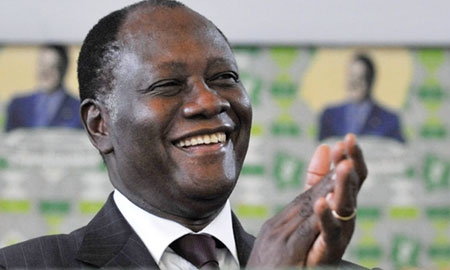Two years after a post-electoral crisis that saw more than 3,000 people killed, Côte d’Ivoire seems well under way to regain its former status of “economic miracle of Africa”. From a 4.5 per cent contraction in 2011, the economy bounced back to a stunning 9.8 per cent in 2012 and 8.7 per cent in 2013, according to the IMF (official figures from Côte d’Ivoire were not yet available at the time of print). It is expected to maintain this Asia-type rate of growth for some years to come.
Abidjan, the economic capital, is starting to look like a gigantic building site: in the area around the Ebrié lagoon, French construction giant Bouygues is building Abidjan’s long-awaited third bridge; the once derelict university building has been renovated; and a revamped 27-storey tower will soon be the office for part of the 4,000-strong staff of the African Development Bank, which is moving back to Abidjan. Hotels are full, notably the emblematic Hotel Ivoire built in the 1960s, and Air France recently highlighted its Paris-Abidjan route with a special Airbus A380 flight, which could become a regular service.
Although Ivoirians are still in large part struggling with poverty, unemployment and the after-effects of a devastating civilian conflict, hope is in the air. And much can be credited to the vision and statesmanship of President Alassane Ouattara. Three years ago, he was under siege in a luxury hotel of Abidjan as Laurent Gbagbo, loser of the presidential poll, refused to relinquish power. Now, Mr Gbagbo awaits trial for crimes against humanity in The Hague, and Mr Ouattara is busy rebuilding the country to make up for the “lost decade” of 2000-2010.
An economist by profession, Alassane Ouattara, 72, has been deputy head of the IMF and was prime minister from 1990 to 1993 under the late President Felix Houphouët-Boigny. Mr Ouattara is fluent in English and has an excellent reputation among the international community as a hard worker and a democrat.
The President acted swiftly to restore peace after taking power in April 2011. A National Enquiry Commission was set up and handed in its report last year. “All the cases are now being examined by the judicial courts, and everybody, from whichever side they are, will be treated equally; there will be no impunity for any violation of human rights,” he declared in an interview with the BBC in March last year.
Mr Ouattara’s economic strategy is to rely on the private sector to boost the economy and reach emerging country status by 2020. This policy is enshrined in the National Development Plan (NDP), which covers the period from 2012 to 2015. Already, the government has secured the help of international donors. The IMF, the World Bank and others gave Côte d’Ivoire more than $4 billion in debt relief in 2012, and last December, donors pledged about $8.6 billion, double the amount sought, to finance the NDP.
The plan is based essentially on a vast programme to modernise and develop infrastructure, and on reforming key sectors such as agriculture – in particular coffee and cocoa, the latter of which Côte d’Ivoire is the largest producer worldwide, with about 35 per cent of the world’s production. Other key sectors include oil and gas, mining, finance and tourism. The government foresees that 60 per cent of the investment needed will come from the private sector.
Investors are already flocking to the country. Among the flagship infrastructure projects financed with foreign investment is the country’s largest hydroelectric dam in Soubré, in the south-west part of the country, built by the Chinese for a total of €360 million. Other key examples can be found in Abidjan, where the Swedish company ABB recently won the tender for the expansion of the Azito electric plant.
In March 2013, India’s Tata Steel announced it would form a consortium to finance the construction of a railway line from its iron concessions in western Côte d’Ivoire to the port of San Pedro in the south. In addition, President Ouattara officially inaugurated the Abidjan-Yamoussoukro motorway last December, which is financed in part by Arab investors.
France, the old colonial power, remains the largest foreign investor but Côte d’Ivoire is now eager to attract investment from other European countries, in particular the UK, and it expects that trade with the UK will double by 2015. This is why Prime Minister Daniel Kablan Duncan travelled to London in October 2013 for a bilateral investment forum, and another large investment event was held in Abidjan at the end of January, called ICI 2014 (ICI stands for Invest in Côte d’Ivoire).
President Ouattara has also made great strides in the international arena. As Chair of the Economic Community of West Africa (ECOWAS), he took decisive action along with France to counter terrorism in Mali last year. He is also a fervent advocate of economic integration among West African countries: “Our economies are too small to stand alone,” he recently declared in an interview with the BBC. “We need more integration to spur growth and development for all our people.”

0 COMMENTS